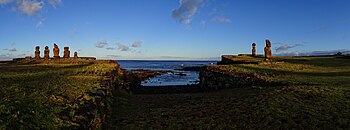Tahai
 From Wikipedia the free encyclopedia
From Wikipedia the free encyclopedia



The Tahai Ceremonial Complex is an archaeological site on Rapa Nui (Easter Island) in Chilean Polynesia. Restored in 1974 by American archaeologist William Mulloy, Tahai comprises three principal ahu from north to south: Ko Te Riku (with restored eyes), Tahai, and Vai Ure. Visible in the distance from Tahai are two restored ahu at Hanga Kio'e, projects that Mulloy undertook in 1972. Like other Mulloy restoration projects at Ahu Akivi, the ceremonial village of Orongo and Vinapu, the ceremonial center at Tahai now constitutes an integral part of the Rapa Nui National Park, designated by UNESCO as a World Heritage site.
William Mulloy and his wife Emily Ross Mulloy are buried at Tahai.
References
[edit]- Mulloy, W.T., and S.R. Fischer. 1993. Easter Island Studies: Contributions to the History of Rapanui in Memory of William T. Mulloy. Oxford: Oxbow Books.
- Mulloy, W.T., World Monuments Fund, and Easter Island Foundation. 1995. The Easter Island Bulletins of William Mulloy. New York; Houston: World Monuments Fund; Easter Island Foundation.
- Norwegian Archaeological Expedition to Easter Island and the East Pacific, T. Heyerdahl, E.N. Ferdon, W.T. Mulloy, A. Skjølsvold, C.S. Smith. 1961. Archaeology of Easter Island. Stockholm; Santa Fe, N.M.: Forum Pub. House; distributed by The School of American Research.
External links
[edit] Media related to Tahai Ceremonial Complex at Wikimedia Commons
Media related to Tahai Ceremonial Complex at Wikimedia Commons- Easter Island Foundation
- William Mulloy Library
- Father Sebastian Englert Anthropology Museum